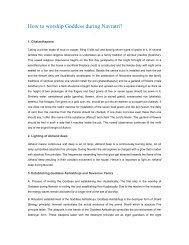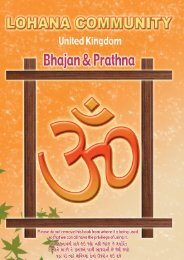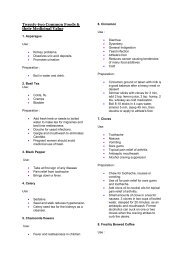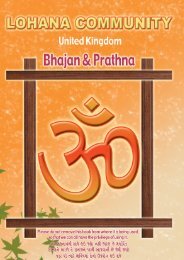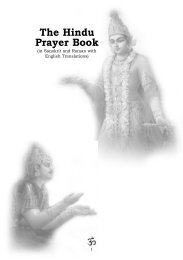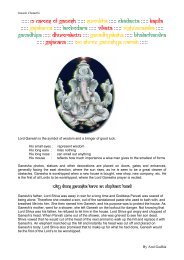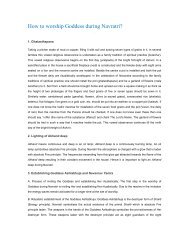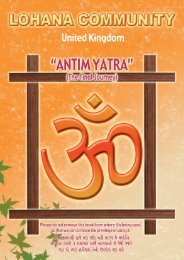It may be said with some degree of certainty that ... - Lohana.info
It may be said with some degree of certainty that ... - Lohana.info
It may be said with some degree of certainty that ... - Lohana.info
You also want an ePaper? Increase the reach of your titles
YUMPU automatically turns print PDFs into web optimized ePapers that Google loves.
vegetarian, the meals are acceptable to to people from different religions and cultures. These lungars have <strong>be</strong>en<br />
appreciated during times <strong>of</strong> disaster, such as following the 2005 tsunami and Hurricane Katrina.<br />
In the Sikh scripture, Guru Granth Sahib, meat consumption is strongly condemned in passages like the following:<br />
"You kill living <strong>be</strong>ings, and call it a righteous action. Tell me, brother, what would you call an unrighteous action?"<br />
Sikhs rigorously denounce animal sacrifice as well. This includes ritual slaughter to sanctify meat for eating, as in the<br />
preparation <strong>of</strong> halal or kosher meat.<br />
The Indian saint and mystic Kabir, a contemporary <strong>of</strong> Guru Nanak who <strong>some</strong> <strong>be</strong>lieve <strong>may</strong> have <strong>be</strong>en Nanak's<br />
preceptor, wrote: "If you say <strong>that</strong> God resides in all, why do you kill a hen? & <strong>It</strong> is foolish to kill an animal by cruelty<br />
and call <strong>that</strong> dead animal sanctified food. & You keep fasts in order to <strong>be</strong>come acceptable to God, but kill a living<br />
animal for your relish."<br />
The ten Gurus <strong>of</strong> Sikhism neither condoned nor condemned meat-eating in a formal way. Although they felt <strong>that</strong> it was<br />
unnecessary to kill animals and birds for food, they did not <strong>be</strong>lieve vegetarianism should <strong>be</strong>come dogma. They<br />
emphasized controlling the contents <strong>of</strong> the mind more than controlling the contents <strong>of</strong> the body. Guru Nanak<br />
apparently considered it futile to argue about food. When pressed to comment on meat-eating, he <strong>said</strong>, "Only the<br />
foolish quarrel over the desirability <strong>of</strong> eating flesh. They are oblivious to true knowledge and meditation. What is flesh?<br />
What is vegetable? Which is sin-infested? Who can say what is good food and <strong>that</strong> which leads to sin?" Today, <strong>some</strong><br />
Sikhs avoid <strong>be</strong>ef and pork, observing the meat prohibitions <strong>of</strong> both Islam and Hinduism. Other groups, such as the<br />
Namdharis and Yogi Bhajan's 3HO Golden Temple Movement, are strictly vegetarian.<br />
Zoroastrianism<br />
Zoroaster inspired compassion through the practice <strong>of</strong> virtue<br />
Zoroastrianism (<strong>some</strong>times called Magianism, Mazdaism or Parseeism) was founded in ancient Persia by the prophet<br />
Zoroaster, also known as Zarathushtra. Although estimates for the birth <strong>of</strong> Zoroaster vary greatly, it is popularly<br />
accepted <strong>that</strong> he lived in pastoral Iran around 600 BC and was an ardent advocate <strong>of</strong> vegetarianism when it was not<br />
customary to <strong>be</strong> so. According to Colin Spencer in The Heretic's Feast, Zoroaster was not only a vegetarian, he also<br />
disavowed animal sacrifice.<br />
Zoroaster emphasized moderation. With regard to food, this meant not eating too much--such as in gluttony, or too<br />
little--such as in fasting. He also taught compassion through the kind treatment <strong>of</strong> all living entities.<br />
Zoroastrians have always had a great respect for nature. Today, this <strong>be</strong>nevolence is incorporated into a lifestyle <strong>that</strong><br />
highlights striving to live <strong>with</strong> sensitivity to the soul force vibrant in all things. Zoroastrian festivals celebrate six<br />
seasons <strong>of</strong> the year, which correspond to six periods <strong>of</strong> creation in nature: mid-spring, mid-summer, the season <strong>of</strong><br />
corn, the season <strong>of</strong> flocks, winter solstice and the fire festival <strong>of</strong> sacrifices.<br />
In the ninth century, the High Priest Atrupat-e Emetan recorded in Denkard, Book VI, his request for Zoroastrians to<br />
<strong>be</strong> vegetarians: "Be plant eaters, O you men, so <strong>that</strong> you <strong>may</strong> live long. Keep away from the body <strong>of</strong> the cattle, and<br />
deeply reckon <strong>that</strong> Ohrmazd, the Lord, has created plants in great num<strong>be</strong>r for helping cattle and men."<br />
Zoroastrian scriptures assert <strong>that</strong> when the "final Saviour <strong>of</strong> the world " arrives, men will give up meat eating.



